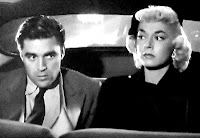 When he was 13, Steve Cochran shot and killed his drunken, abusive father; tried as an adult, he served 18 years in prison and is now being released with a chunk of money he earned through work, a cheap suit, and bus fare. He's hardened over the years, but he's not broken, and he sets out to start a new life. In a diner, Cochran is befriended by John Kellogg who helps him get a job as a welder, but Cochran soon discovers that Kellogg is a reporter who writes a sensationalistic front page story about him, so he leaves for New York City, hoping for anonymity in the big city. At a dime-a-dance joint, he meets up with tough blonde Ruth Roman; she shows him around town and he falls hard for her. It turns out she's being "kept" by a cop (Hugh Sanders), and when the three have words, the violent Sanders knocks out Cochran, then Roman (more or less accidentally) shoots Sanders. When Cochran comes to, Roman lets him think that he shot Sanders, and when they find out the cop has died, the two go on the run, winding up in a California farming camp where they get married, bond with another couple, and seem to be on the way to living a normal life. But soon Cochran is recognized when his picture is run in a true crime magazine—will they run again and stay and make a stand? And will Roman come clean with Cochran?
When he was 13, Steve Cochran shot and killed his drunken, abusive father; tried as an adult, he served 18 years in prison and is now being released with a chunk of money he earned through work, a cheap suit, and bus fare. He's hardened over the years, but he's not broken, and he sets out to start a new life. In a diner, Cochran is befriended by John Kellogg who helps him get a job as a welder, but Cochran soon discovers that Kellogg is a reporter who writes a sensationalistic front page story about him, so he leaves for New York City, hoping for anonymity in the big city. At a dime-a-dance joint, he meets up with tough blonde Ruth Roman; she shows him around town and he falls hard for her. It turns out she's being "kept" by a cop (Hugh Sanders), and when the three have words, the violent Sanders knocks out Cochran, then Roman (more or less accidentally) shoots Sanders. When Cochran comes to, Roman lets him think that he shot Sanders, and when they find out the cop has died, the two go on the run, winding up in a California farming camp where they get married, bond with another couple, and seem to be on the way to living a normal life. But soon Cochran is recognized when his picture is run in a true crime magazine—will they run again and stay and make a stand? And will Roman come clean with Cochran?I am now an official Steve Cochran fan. With his dark, handsome, brooding look, he had a decent career in B-films, often noir or crime films, often as a conflicted hero (as here) or anti-hero (as in PRIVATE HELL 36). He may not have been an Oscar-caliber actor, but he brought a certain presence to his roles that generated the required heat or coolness as called for—he could come off as a dumb lug, a smart average guy, a slick seducer, or a naïve sucker. Here, he exhibits bits of all those personas: he's not dumb, exactly, but having grown up behind bars, he is unschooled socially, and part of the appeal of the first half of the movie is watching him negotiate his return to society. Roman is good as a tough gal who slowly softens up (and goes from brassy blonde to natural dark hair)—we keep hoping she doesn't quite have it in her to truly be a femme fatale. In the supporting cast, Lurene Tuttle stands out as a co-worker at the farm, and Lee Patrick (Effie in THE MALTESE FALCON) has a small but effective bit as Roman's sister. The latter half, set at the farm camp, feels at times like a serious version of IT HAPPENED ONE NIGHT. Despite an ending that is a little too sunny and ties up loose ends a little too neatly, this is a standout film noir. [TCM; also on DVD]

No comments:
Post a Comment